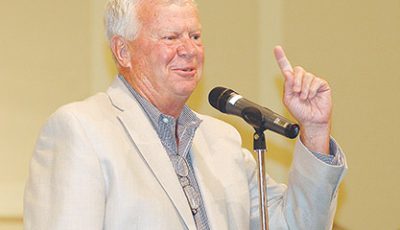Ky. Open Meetings Law is vital component of our commonwealth
In 1974, one of the public’s greatest tools for holding public agencies in Kentucky accountable was passed by the General Assembly.
The Kentucky Open Meetings Law gives the public the right to attend the meetings of public agencies. With a few exceptions, the public has the right to know and see how decisions are made and who is making the decisions.
While many public meetings do not see a large numbers of attendees, it is important for public agencies to host meetings in accordance with the law for several reasons:
1) It is the law.
2) We live in a democratic republic not an oligarchy.
3) People have the right to know how decisions are being made.
4) People have the right to see who, how and why people vote on the decisions that impact their lives.
5) People have the right to question the decisions being made.
Let’s break down those reasons even further.
First, following the open meeting law is important because … it is a law. It was written and established with the idea that the public has a right to know what public agencies are doing. By intentionally not following the law, public agencies undermine the public’s rights and create the underpinnings of an oligarchy.
This leads to my second reason why following the law is important – in the United States, we live under a form of government called a democratic republic. This basically means that we elect a group of individuals that represent us when decisions are being made. This differs from a democracy where each individual votes directly in the decision-making process.
You may be asking, ‘Well, how is this relevant when some members of public agencies are appointed by other officials?’
I am glad you asked. The appointed officials are typically selected by individuals who were elected, therefore, because the public gets to elect those who will do the appointing, we also get to inadvertently select the appointed officials.
This is all relevant to the Kentucky Open Meetings Law because when the law is ignored and the public is left out of the loop, it transforms that public agency from a democratic republic to an oligarchy. An oligarchy occurs when a small group of people make decisions for a large group of people.
The crux of a democratic republic is that people decide who the decision makers are. To do that, it is important to know how decisions are being made, have the right to see who is voting, what they are voting on and why they are voting on it, and ultimately the right to question the decision being made.
These three points lie at the heart of the Kentucky Open Meetings Law.
People have the right to know how decisions are being made. This is particularly important in instances like budgets. People have a right to know how the budget for a town or city is compiled. We have the right to see that process as it is taking place.
While it is important to know and see the process, it is also crucial that people understand and can see who is voting, what they are voting on, and why they are voting on it.
Issues like a budget are pretty self-explanatory in terms of who is voting, what they are voting on and why – in the case of a city, it is usually the city council or commissioners voting on how the money will be allocated for the city because the city needs to stay out of large amounts of debt.
Issues like the termination of employees may not be so clear though. While the voting body may not be in question, what they are voting on and why may not be so self-evident.
For example, in 2018 the Eastern Kentucky University Board of Regents made the decision to terminate approximately 120 employees, but it was done in closed session. While the action was later ruled by the Kentucky Attorney General to be in violation of the law, it meant that individuals did not know exactly what was being decided or why until after it was all said and done.
The university was facing budget issues, but the specifics of the what and why were very unclear for quite some time.
Finally, people have the right to question the decisions being made. For me personally, this is why I believe the Kentucky Open Meetings Law is absolutely crucial.
When decisions are being made, people have the right to question why it was made. If meetings are conducted in closed session, or without the public, they often do not have a detailed record in the minutes of what was discussed.
According to the Kentucky Open Records Act, passed in 1976, the minutes of meetings by public agencies can be inspected by the public. If meetings are discussed in closed session, often the person who is acting as secretary for the board is not in attendance.
Since the secretary often is in charge of recording the minutes for the meeting, them not being present usually translates into the minutes being vague about what was discussed or not including the discussion at all.
If decisions are being made in closed session, people often not only don’t know the discussion that lead to the decision, but they aren’t present to see the decision being made.
It is difficult to question a decision if you don’t know about it.
We, the people, have a say in who is on the boards of public agencies, whether we elect them directly or they are appointed by the people we chose. Even for those public agencies who are only classified as such because of tax dollars, we still choose because we pay the taxes which they receive.
People have the right to question the decisions, and if we don’t like them, we have the right to choose someone else to vote on our behalf next time.
By intentionally, or even unintentionally, not following the Kentucky Open Meetings Law, public agencies cut the public out of the decision-making process. It is for that reason, it is important for the public to understand and stand up for their right to be present in the room where decisions are being made.








